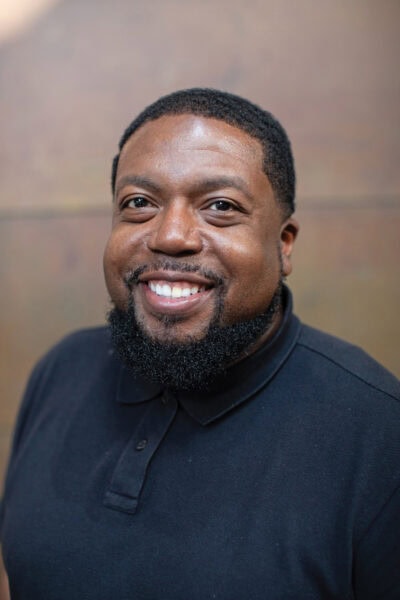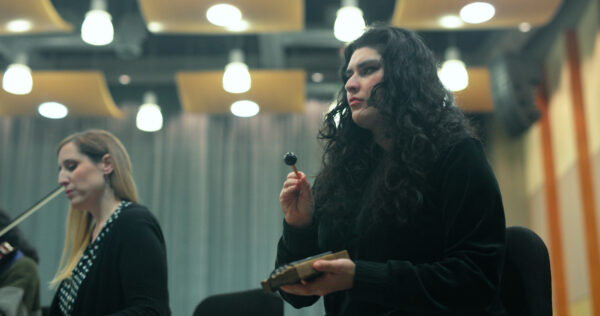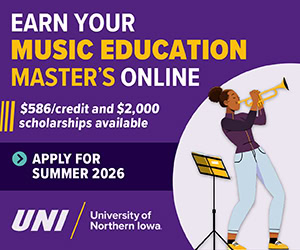/ News Posts / The Music Educator Today and Tomorrow
The Music Educator Today and Tomorrow
By NAfME Member Adrian Davis
This article first appeared in the December 2024 issue of Interval, the Minnesota Music Educators Association journal.
“I believe that there must be a full acknowledgement that the profession is education, first.”
Defining something from my perspective is more about making meaning of or in a situation. When I make meaning of something, it must involve my whoness, meaning a personal awareness of my own identity, aligned with experiences that are influenced and impacted by my core beliefs. It is who I am. I am a Black man, and my village travels with me everywhere I go. That is my way of knowing and being. No one can define anything for you. You must define it for yourself. However, I am happy to describe some ideas for you that may resonate.
Consider the situation: being a music educator. I believe that there must be a full acknowledgement that the profession is education, first. There is an inherent silo or armory that comes along with music education. However, you must always remember that especially in school music education, you are part of a whole. You must advocate for your content area, while finding ways to connect with other content areas (STEM, social studies, language arts, etc.). You are always fighting for relevance, validation, and funding. This has historically been the case for music education in the United States since the days of the Space Race in the 1950s, A Nation at Risk in the 1980s, The No Child Left Behind Act in the 2000s, and it will continue to be a similar fight in the foreseeable future (Heuschele, 2022; Richerme, 2012; Simpson et. al, 2004). I describe education as a conscious and active drawing out of a wide range of information from a learner that has subconsciously existed all the time. Music is simply the medium that we utilize to draw that information out. We are MORE than music educators. We educate through music.
How could/should education through music happen? From my perspective, there must be an acknowledgement that the system of education in the United States was designed and continues to multidimensionally function in ways that resist change, while oppressing and sorting humans. Being an educator today means not being satisfied with interruption or surfacy awareness. A music educator must be disruptive or critically conscious in addressing and/or dismantling curriculum, pedagogy, policy, and spaces that continue to reproduce racism, sexism, and classism. Those latter three categories in the United States have been historically utilized to sort people (Rothenberg, 2023; Love, 2019). There must be space for counterknowledge and counternarratives in school music programs. The system is not broken. It is working for how and for who it was originally designed: To support the agenda and needs of white, heterosexual, Protestant, males–first, and in some cases, only. I recommend reading the NAfME Blueprint for Strengthening the Music Teacher Profession, which addresses many ways of disrupting the supremacist agenda. Many facets within the Blueprint also highlight a greater connection between music education and the music industry, because they are one and the same.
As an educator of music, building career capital is important. These are skills, connections, and other resources that increase a person’s viability in the job market. Having relevant and active skills in performance and technology is a must. Keep singing. Keep playing. Learn the basic functions of a Digital Audio Workstation (DAW). Learn how to DJ, or make a podcast, or an audiobook, or a movie trailer. Why? Because that is what many of our students in today’s generation see and want to do. Today’s learner wants to see you do it at a high level before they try. You must be a relevant model. The so-called traditional path to a music teacher career has changed. An educator of music must provide curriculum and pedagogy for learners to create their own path, perhaps an individualized education plan—one that meets a learner’s individual needs and avoids school from becoming an obedience school or a factory of compliance. Concerns in music education have rested for many years around gatekeepers, but music educators should also be mindful not to be a gate creator, reproducing violent socioacademic inequities that harm already underrepresented populations.
The so-called traditional path is still viable; however, in what is now the third decade of the twenty-first century, an educator of music must be able to market and promote their programs. Your great music product must demonstrate and amplify the process for the learner and the teacher. Within that process, develop a live product accompanied by data that show student achievement in and through arts with curriculum and pedagogy at all levels intentionally promoting positive and healthy racial diversity, gender diversity, and neurodiversity (Bowen & Kisida, 2023; Young, 2023). Marketing/promotion, balance of process/product, data that show achievement and DEI (Diversity, Equity, and Inclusion) impact is the three-legged stool for the current and future music educator: If you are missing any legs from that stool, what will happen? The stool will fall.
Always update and upgrade yourself. Remember, you are an educator, who teaches music. Malcolm X (1964) said, “Education is the passport to the future. Tomorrow is for those who plan for it today.”
References
Bowen, D.H., and Kisida, B. (2023). The fine art of school engagement: How expanding arts education affects learning, behavior, and social-emotional growth. Education Next, 23(3), 48-54.
Confredo, D., Abril, C., & Adderly, C. (Eds.). (2023). A Blueprint for Strengthening the Music Teacher Profession. NAfME.
Heuschele, E. (2022). A history of the eclectic string movement in American music education 1967-2017. Retrieved from the University Digital Conservancy.
Kapalka Richerme, L. (2012). Remain or react: The music education profession’s responses to Sputnik and A Nation at Risk. Arts Education Policy Review, 113(1), 35–44.
Love, B. L. (2019). We want to do more than survive: Abolitionist teaching and the pursuit of educational freedom. Beacon Press.
Rothenberg, P. S. (2023). Race, class, and gender in the United States: An integrated study (12th ed.). Worth Publishers, Incorporated.
Simpson, R. L. , Sampson , P. G. and Graner , P. (2004). The no child left behind act: Challenges and implications for educators. Intervention in School and Clinic, 40(2), 67–75.
X, M. (1970). By any means necessary: Speeches, interviews, and a letter by Malcolm X. Pathfinder.
Young, D. (2023). Visual Arts/Performing Arts critical to student success. National Federation of State High School Associations.
About the author:
 NAfME National Executive Board member and NAfME Equity Committee member Dr. Adrian Davis is an Assistant Professor of Music Education at the University of Minnesota, and the director of the University of Minnesota Gospel Choir. His research interests center around various facets of equity, racial and gender diversity, and spanning boundaries in music education through curriculum, pedagogy, policy, and spaces. He serves as the Performing Arts Coordinator for Saint Paul Public Schools. He is a member of the Equity Committee for NAfME and past president of the Minnesota Music Educators Association. Throughout his career in education, primarily in K–12, he has specialized in instrumental, choral, and music production. He is an active musician and producer, and owns Divers Music, a music production company which he founded in 2008.
NAfME National Executive Board member and NAfME Equity Committee member Dr. Adrian Davis is an Assistant Professor of Music Education at the University of Minnesota, and the director of the University of Minnesota Gospel Choir. His research interests center around various facets of equity, racial and gender diversity, and spanning boundaries in music education through curriculum, pedagogy, policy, and spaces. He serves as the Performing Arts Coordinator for Saint Paul Public Schools. He is a member of the Equity Committee for NAfME and past president of the Minnesota Music Educators Association. Throughout his career in education, primarily in K–12, he has specialized in instrumental, choral, and music production. He is an active musician and producer, and owns Divers Music, a music production company which he founded in 2008.
Interested in reprinting this article? Please review the reprint guidelines.
The National Association for Music Education (NAfME) provides a number of forums for the sharing of information and opinion, including blogs and postings on our website, articles and columns in our magazines and journals, and postings to our Amplify member portal. Unless specifically noted, the views expressed in these media do not necessarily represent the policy or views of the Association, its officers, or its employees.
Published Date
March 27, 2025
Category
- Careers
- Diversity, Equity, Inclusion, and Access (DEIA)
- Music Education Profession
- Music Educator Workforce
- Preparation
- Recruitment
- Representation
Copyright
March 27, 2025. © National Association for Music Education (NAfME.org)





